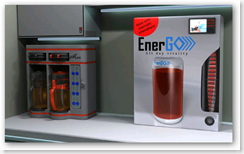Sound like we just can't make up our minds....we have pills to help insomnia, now there are pills to keep you alert longer, one FDA approved...but it does not replace sleep by any means...maybe we just need some additional Prozac in the water? I'll stick with my coffee....BD
"Cutting out four hours of sleep a night would free up almost 1,500 extra hours a year. That's an additional nine months´ worth of standard 40-hour workweeks-plenty of time to earn a promotion or start your own company on the side (or, worst case, slog away in obscurity)."...how far will the limit be pushed? BD
Want to keep pace with the competition? Forget coffee-a new class of FDA-approved stimulants will keep you working harder, better, faster and stronger.

This emerging breed of wakefulness pills promises to keep the workers of tomorrow not just awake, but alert, on-task and feeling fine through the night and well into the next day. Remember these names, because they´re your future: Modafinil, approved by the Food and Drug Administration in 1998 for the treatment of narcolepsy and marketed in the U.S. as Provigil, is already giving a competitive edge to everyone from Air Force pilots on 40-hour missions to (less legally) college students cramming for exams. The drug´s maker, Cephalon in Frazer, Pennsylvania, is awaiting FDA approval for armodafinil, which promises even longer periods of wakefulness on a single dose, and Irvine, California based Cortex is working on its own drug, code-named CX717 and developed with funding from the military. The drugs are targeted at sleep disorders like narcolepsy, but it's their dramatic potential influence on the workplace that has researchers and efficiency experts buzzing.
For better or worse, when the trend takes hold, there will be no going back. Imagine sticking to double lattes while everyone else in the office-or at the start-up down the road-is juicing on the latest eugeroic, and you´ll seem as naive and obsolete as the NFL linesman who swears by protein shakes alone. Any worker could benefit, says University of Virginia bioethicist Jonathan Moreno, author of the recent book Mind Wars.



Hi!
ReplyDeleteThis is Nice Blog!
Drug rehabilitation tends to address a stated twofold nature of drug dependency: physical and psychological dependency. Physical dependency involves a detoxification process to cope with withdrawal symptoms from regular use of a drug. With regular use of many drugs, legal or otherwise, the brain gradually adapts to the presence of the drug so that the desired effect is minimal. Apparently normal functioning of the user may be observed, despite being under the influence of the drug. This is how physical tolerance develops to drugs such as heroin, amphetamines, cocaine, nicotine or alcohol. It also explains why more of the drug is needed to get the same effect with regular use. The abrupt cessation of taking a drug can lead to withdrawal symptoms where the body may take weeks or months (depending on the drug involved) to return to normal.Drug Rehabilitation Center makes relief from Drugs!